Exploring Cognitive Coaching's Impact on English Language Students
VerifiedAdded on 2023/06/04
|17
|4266
|369
Report
AI Summary
This report investigates the impact of cognitive coaching on the efficacy of English language students, particularly within the context of Qatar University's B.Ed program. It begins by establishing the importance of both cognitive and non-cognitive skills in student development and highlights the problem of focusing primarily on non-cognitive aspects. The research aims to determine how cognitive coaching by teachers can enhance the efficacy of English language learners, exploring various methods used by teachers to facilitate cognitive development. The study employs a quasi-experimental design and semi-structured interviews to gather data, focusing on teacher perceptions and the relationship between efficacy and cognitive coaching processes. The literature review examines internship models, including field-based, performance evaluation, working experience, and self-perception models, as well as the role of teacher efficacy in motivating students and promoting academic achievement. Ultimately, the report seeks to understand how cognitive coaching can contribute to the professional development and skill enhancement of English language students.

EDUCATIONAL SCIENCE
Paraphrase This Document
Need a fresh take? Get an instant paraphrase of this document with our AI Paraphraser
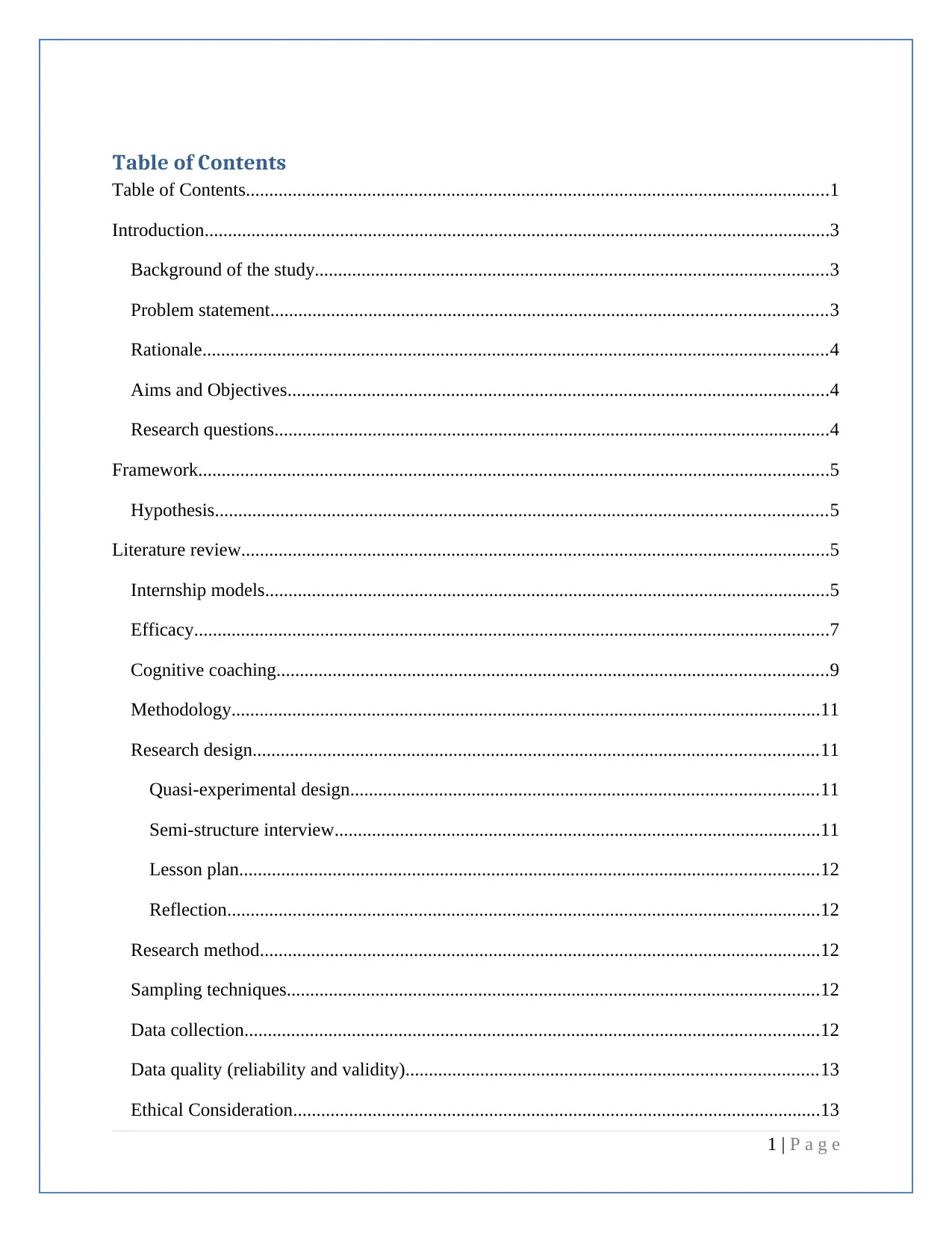
Table of Contents
Table of Contents.............................................................................................................................1
Introduction......................................................................................................................................3
Background of the study..............................................................................................................3
Problem statement.......................................................................................................................3
Rationale......................................................................................................................................4
Aims and Objectives....................................................................................................................4
Research questions.......................................................................................................................4
Framework.......................................................................................................................................5
Hypothesis...................................................................................................................................5
Literature review..............................................................................................................................5
Internship models.........................................................................................................................5
Efficacy........................................................................................................................................7
Cognitive coaching......................................................................................................................9
Methodology..............................................................................................................................11
Research design.........................................................................................................................11
Quasi-experimental design....................................................................................................11
Semi-structure interview........................................................................................................11
Lesson plan............................................................................................................................12
Reflection...............................................................................................................................12
Research method........................................................................................................................12
Sampling techniques..................................................................................................................12
Data collection...........................................................................................................................12
Data quality (reliability and validity)........................................................................................13
Ethical Consideration.................................................................................................................13
1 | P a g e
Table of Contents.............................................................................................................................1
Introduction......................................................................................................................................3
Background of the study..............................................................................................................3
Problem statement.......................................................................................................................3
Rationale......................................................................................................................................4
Aims and Objectives....................................................................................................................4
Research questions.......................................................................................................................4
Framework.......................................................................................................................................5
Hypothesis...................................................................................................................................5
Literature review..............................................................................................................................5
Internship models.........................................................................................................................5
Efficacy........................................................................................................................................7
Cognitive coaching......................................................................................................................9
Methodology..............................................................................................................................11
Research design.........................................................................................................................11
Quasi-experimental design....................................................................................................11
Semi-structure interview........................................................................................................11
Lesson plan............................................................................................................................12
Reflection...............................................................................................................................12
Research method........................................................................................................................12
Sampling techniques..................................................................................................................12
Data collection...........................................................................................................................12
Data quality (reliability and validity)........................................................................................13
Ethical Consideration.................................................................................................................13
1 | P a g e

Reference List...............................................................................................................................14
2 | P a g e
2 | P a g e
⊘ This is a preview!⊘
Do you want full access?
Subscribe today to unlock all pages.

Trusted by 1+ million students worldwide
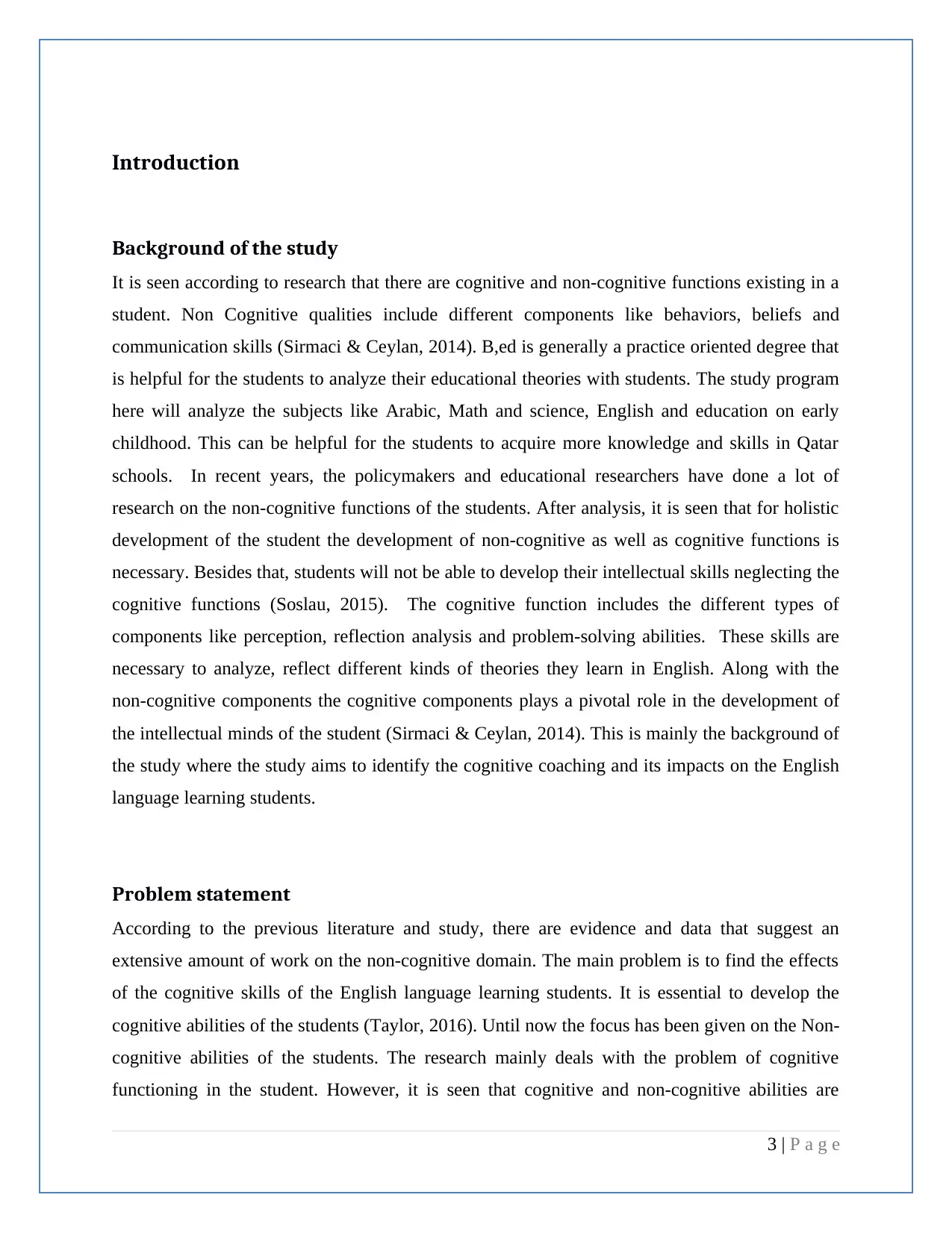
Introduction
Background of the study
It is seen according to research that there are cognitive and non-cognitive functions existing in a
student. Non Cognitive qualities include different components like behaviors, beliefs and
communication skills (Sirmaci & Ceylan, 2014). B,ed is generally a practice oriented degree that
is helpful for the students to analyze their educational theories with students. The study program
here will analyze the subjects like Arabic, Math and science, English and education on early
childhood. This can be helpful for the students to acquire more knowledge and skills in Qatar
schools. In recent years, the policymakers and educational researchers have done a lot of
research on the non-cognitive functions of the students. After analysis, it is seen that for holistic
development of the student the development of non-cognitive as well as cognitive functions is
necessary. Besides that, students will not be able to develop their intellectual skills neglecting the
cognitive functions (Soslau, 2015). The cognitive function includes the different types of
components like perception, reflection analysis and problem-solving abilities. These skills are
necessary to analyze, reflect different kinds of theories they learn in English. Along with the
non-cognitive components the cognitive components plays a pivotal role in the development of
the intellectual minds of the student (Sirmaci & Ceylan, 2014). This is mainly the background of
the study where the study aims to identify the cognitive coaching and its impacts on the English
language learning students.
Problem statement
According to the previous literature and study, there are evidence and data that suggest an
extensive amount of work on the non-cognitive domain. The main problem is to find the effects
of the cognitive skills of the English language learning students. It is essential to develop the
cognitive abilities of the students (Taylor, 2016). Until now the focus has been given on the Non-
cognitive abilities of the students. The research mainly deals with the problem of cognitive
functioning in the student. However, it is seen that cognitive and non-cognitive abilities are
3 | P a g e
Background of the study
It is seen according to research that there are cognitive and non-cognitive functions existing in a
student. Non Cognitive qualities include different components like behaviors, beliefs and
communication skills (Sirmaci & Ceylan, 2014). B,ed is generally a practice oriented degree that
is helpful for the students to analyze their educational theories with students. The study program
here will analyze the subjects like Arabic, Math and science, English and education on early
childhood. This can be helpful for the students to acquire more knowledge and skills in Qatar
schools. In recent years, the policymakers and educational researchers have done a lot of
research on the non-cognitive functions of the students. After analysis, it is seen that for holistic
development of the student the development of non-cognitive as well as cognitive functions is
necessary. Besides that, students will not be able to develop their intellectual skills neglecting the
cognitive functions (Soslau, 2015). The cognitive function includes the different types of
components like perception, reflection analysis and problem-solving abilities. These skills are
necessary to analyze, reflect different kinds of theories they learn in English. Along with the
non-cognitive components the cognitive components plays a pivotal role in the development of
the intellectual minds of the student (Sirmaci & Ceylan, 2014). This is mainly the background of
the study where the study aims to identify the cognitive coaching and its impacts on the English
language learning students.
Problem statement
According to the previous literature and study, there are evidence and data that suggest an
extensive amount of work on the non-cognitive domain. The main problem is to find the effects
of the cognitive skills of the English language learning students. It is essential to develop the
cognitive abilities of the students (Taylor, 2016). Until now the focus has been given on the Non-
cognitive abilities of the students. The research mainly deals with the problem of cognitive
functioning in the student. However, it is seen that cognitive and non-cognitive abilities are
3 | P a g e
Paraphrase This Document
Need a fresh take? Get an instant paraphrase of this document with our AI Paraphraser
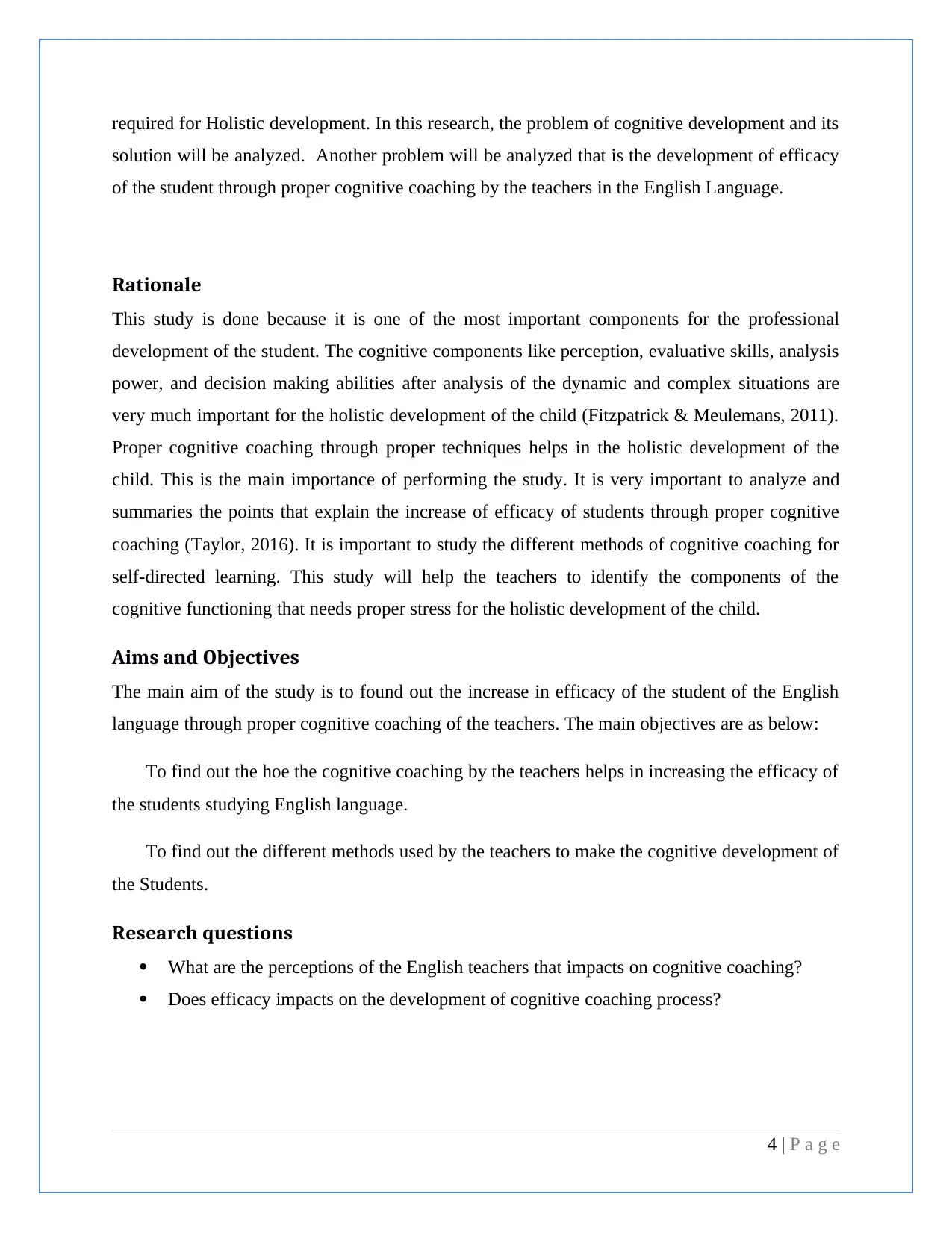
required for Holistic development. In this research, the problem of cognitive development and its
solution will be analyzed. Another problem will be analyzed that is the development of efficacy
of the student through proper cognitive coaching by the teachers in the English Language.
Rationale
This study is done because it is one of the most important components for the professional
development of the student. The cognitive components like perception, evaluative skills, analysis
power, and decision making abilities after analysis of the dynamic and complex situations are
very much important for the holistic development of the child (Fitzpatrick & Meulemans, 2011).
Proper cognitive coaching through proper techniques helps in the holistic development of the
child. This is the main importance of performing the study. It is very important to analyze and
summaries the points that explain the increase of efficacy of students through proper cognitive
coaching (Taylor, 2016). It is important to study the different methods of cognitive coaching for
self-directed learning. This study will help the teachers to identify the components of the
cognitive functioning that needs proper stress for the holistic development of the child.
Aims and Objectives
The main aim of the study is to found out the increase in efficacy of the student of the English
language through proper cognitive coaching of the teachers. The main objectives are as below:
To find out the hoe the cognitive coaching by the teachers helps in increasing the efficacy of
the students studying English language.
To find out the different methods used by the teachers to make the cognitive development of
the Students.
Research questions
What are the perceptions of the English teachers that impacts on cognitive coaching?
Does efficacy impacts on the development of cognitive coaching process?
4 | P a g e
solution will be analyzed. Another problem will be analyzed that is the development of efficacy
of the student through proper cognitive coaching by the teachers in the English Language.
Rationale
This study is done because it is one of the most important components for the professional
development of the student. The cognitive components like perception, evaluative skills, analysis
power, and decision making abilities after analysis of the dynamic and complex situations are
very much important for the holistic development of the child (Fitzpatrick & Meulemans, 2011).
Proper cognitive coaching through proper techniques helps in the holistic development of the
child. This is the main importance of performing the study. It is very important to analyze and
summaries the points that explain the increase of efficacy of students through proper cognitive
coaching (Taylor, 2016). It is important to study the different methods of cognitive coaching for
self-directed learning. This study will help the teachers to identify the components of the
cognitive functioning that needs proper stress for the holistic development of the child.
Aims and Objectives
The main aim of the study is to found out the increase in efficacy of the student of the English
language through proper cognitive coaching of the teachers. The main objectives are as below:
To find out the hoe the cognitive coaching by the teachers helps in increasing the efficacy of
the students studying English language.
To find out the different methods used by the teachers to make the cognitive development of
the Students.
Research questions
What are the perceptions of the English teachers that impacts on cognitive coaching?
Does efficacy impacts on the development of cognitive coaching process?
4 | P a g e
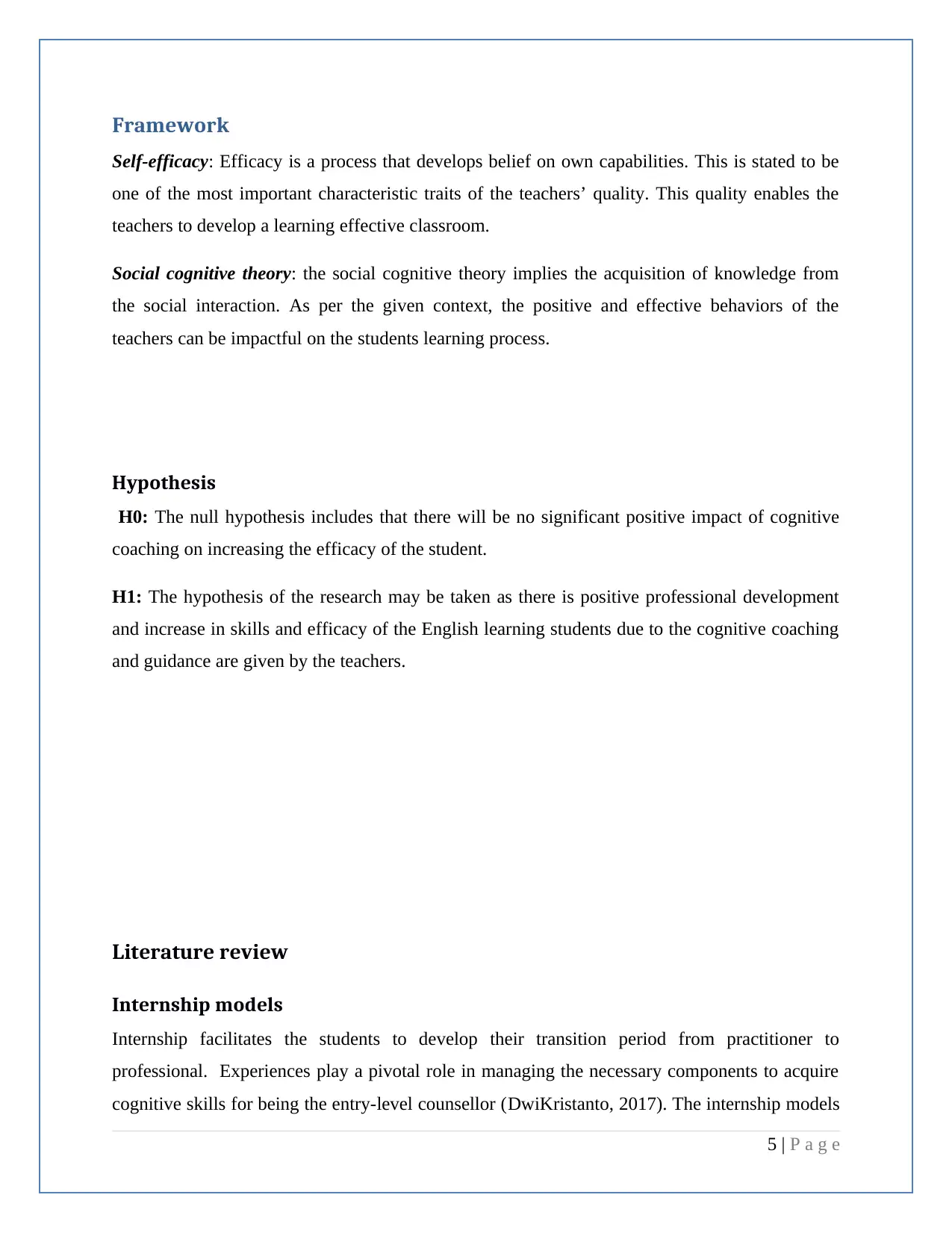
Framework
Self-efficacy: Efficacy is a process that develops belief on own capabilities. This is stated to be
one of the most important characteristic traits of the teachers’ quality. This quality enables the
teachers to develop a learning effective classroom.
Social cognitive theory: the social cognitive theory implies the acquisition of knowledge from
the social interaction. As per the given context, the positive and effective behaviors of the
teachers can be impactful on the students learning process.
Hypothesis
H0: The null hypothesis includes that there will be no significant positive impact of cognitive
coaching on increasing the efficacy of the student.
H1: The hypothesis of the research may be taken as there is positive professional development
and increase in skills and efficacy of the English learning students due to the cognitive coaching
and guidance are given by the teachers.
Literature review
Internship models
Internship facilitates the students to develop their transition period from practitioner to
professional. Experiences play a pivotal role in managing the necessary components to acquire
cognitive skills for being the entry-level counsellor (DwiKristanto, 2017). The internship models
5 | P a g e
Self-efficacy: Efficacy is a process that develops belief on own capabilities. This is stated to be
one of the most important characteristic traits of the teachers’ quality. This quality enables the
teachers to develop a learning effective classroom.
Social cognitive theory: the social cognitive theory implies the acquisition of knowledge from
the social interaction. As per the given context, the positive and effective behaviors of the
teachers can be impactful on the students learning process.
Hypothesis
H0: The null hypothesis includes that there will be no significant positive impact of cognitive
coaching on increasing the efficacy of the student.
H1: The hypothesis of the research may be taken as there is positive professional development
and increase in skills and efficacy of the English learning students due to the cognitive coaching
and guidance are given by the teachers.
Literature review
Internship models
Internship facilitates the students to develop their transition period from practitioner to
professional. Experiences play a pivotal role in managing the necessary components to acquire
cognitive skills for being the entry-level counsellor (DwiKristanto, 2017). The internship models
5 | P a g e
⊘ This is a preview!⊘
Do you want full access?
Subscribe today to unlock all pages.

Trusted by 1+ million students worldwide
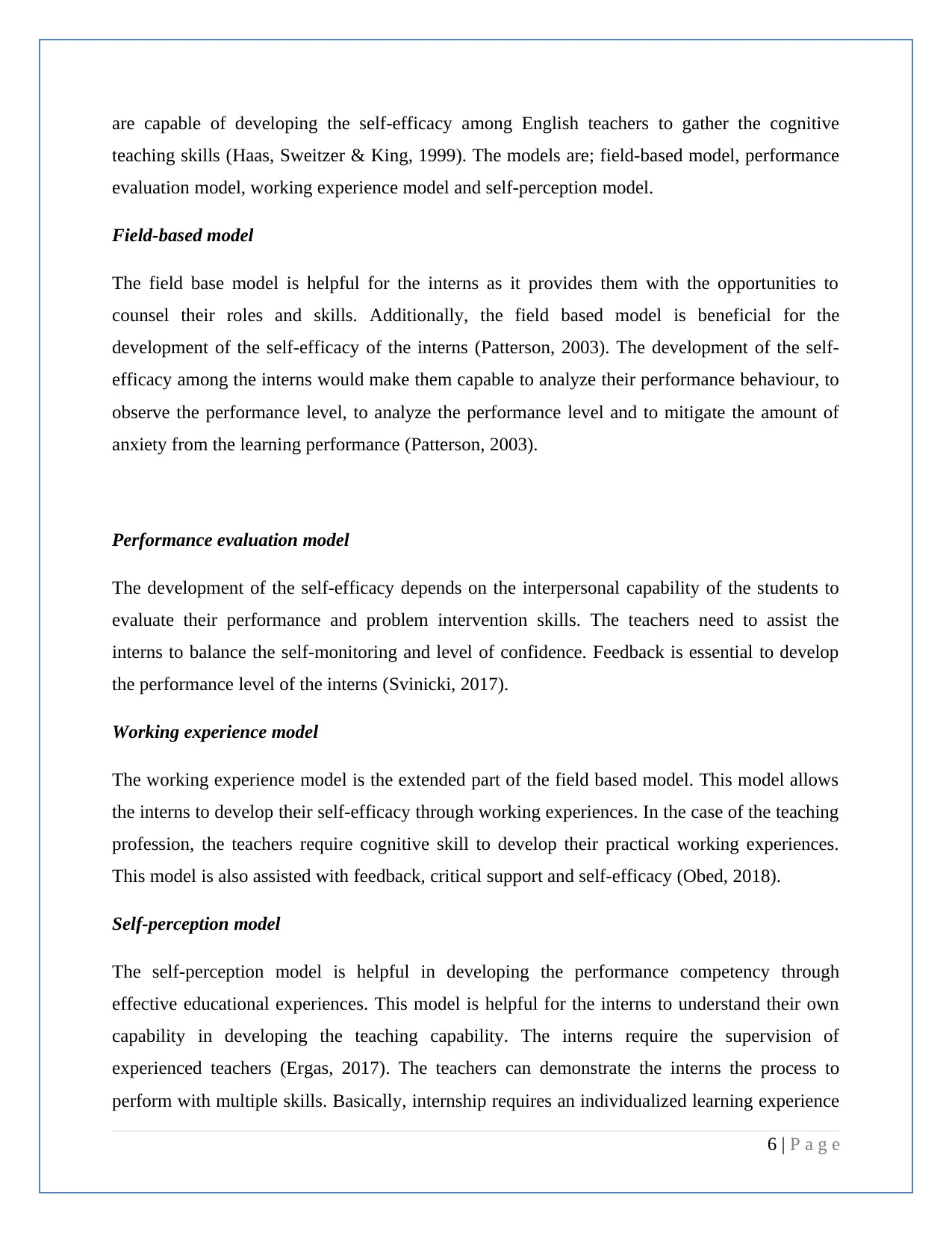
are capable of developing the self-efficacy among English teachers to gather the cognitive
teaching skills (Haas, Sweitzer & King, 1999). The models are; field-based model, performance
evaluation model, working experience model and self-perception model.
Field-based model
The field base model is helpful for the interns as it provides them with the opportunities to
counsel their roles and skills. Additionally, the field based model is beneficial for the
development of the self-efficacy of the interns (Patterson, 2003). The development of the self-
efficacy among the interns would make them capable to analyze their performance behaviour, to
observe the performance level, to analyze the performance level and to mitigate the amount of
anxiety from the learning performance (Patterson, 2003).
Performance evaluation model
The development of the self-efficacy depends on the interpersonal capability of the students to
evaluate their performance and problem intervention skills. The teachers need to assist the
interns to balance the self-monitoring and level of confidence. Feedback is essential to develop
the performance level of the interns (Svinicki, 2017).
Working experience model
The working experience model is the extended part of the field based model. This model allows
the interns to develop their self-efficacy through working experiences. In the case of the teaching
profession, the teachers require cognitive skill to develop their practical working experiences.
This model is also assisted with feedback, critical support and self-efficacy (Obed, 2018).
Self-perception model
The self-perception model is helpful in developing the performance competency through
effective educational experiences. This model is helpful for the interns to understand their own
capability in developing the teaching capability. The interns require the supervision of
experienced teachers (Ergas, 2017). The teachers can demonstrate the interns the process to
perform with multiple skills. Basically, internship requires an individualized learning experience
6 | P a g e
teaching skills (Haas, Sweitzer & King, 1999). The models are; field-based model, performance
evaluation model, working experience model and self-perception model.
Field-based model
The field base model is helpful for the interns as it provides them with the opportunities to
counsel their roles and skills. Additionally, the field based model is beneficial for the
development of the self-efficacy of the interns (Patterson, 2003). The development of the self-
efficacy among the interns would make them capable to analyze their performance behaviour, to
observe the performance level, to analyze the performance level and to mitigate the amount of
anxiety from the learning performance (Patterson, 2003).
Performance evaluation model
The development of the self-efficacy depends on the interpersonal capability of the students to
evaluate their performance and problem intervention skills. The teachers need to assist the
interns to balance the self-monitoring and level of confidence. Feedback is essential to develop
the performance level of the interns (Svinicki, 2017).
Working experience model
The working experience model is the extended part of the field based model. This model allows
the interns to develop their self-efficacy through working experiences. In the case of the teaching
profession, the teachers require cognitive skill to develop their practical working experiences.
This model is also assisted with feedback, critical support and self-efficacy (Obed, 2018).
Self-perception model
The self-perception model is helpful in developing the performance competency through
effective educational experiences. This model is helpful for the interns to understand their own
capability in developing the teaching capability. The interns require the supervision of
experienced teachers (Ergas, 2017). The teachers can demonstrate the interns the process to
perform with multiple skills. Basically, internship requires an individualized learning experience
6 | P a g e
Paraphrase This Document
Need a fresh take? Get an instant paraphrase of this document with our AI Paraphraser
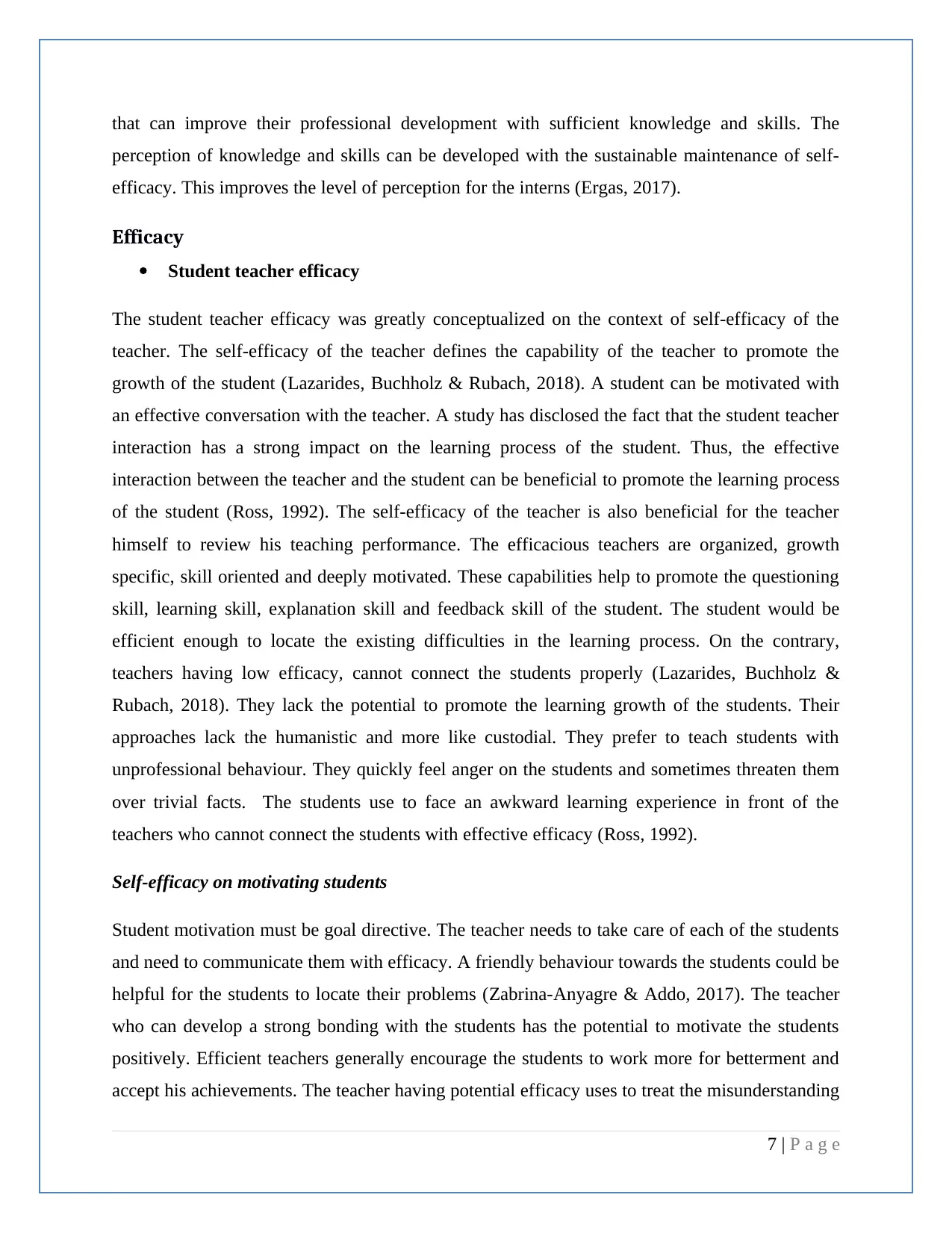
that can improve their professional development with sufficient knowledge and skills. The
perception of knowledge and skills can be developed with the sustainable maintenance of self-
efficacy. This improves the level of perception for the interns (Ergas, 2017).
Efficacy
Student teacher efficacy
The student teacher efficacy was greatly conceptualized on the context of self-efficacy of the
teacher. The self-efficacy of the teacher defines the capability of the teacher to promote the
growth of the student (Lazarides, Buchholz & Rubach, 2018). A student can be motivated with
an effective conversation with the teacher. A study has disclosed the fact that the student teacher
interaction has a strong impact on the learning process of the student. Thus, the effective
interaction between the teacher and the student can be beneficial to promote the learning process
of the student (Ross, 1992). The self-efficacy of the teacher is also beneficial for the teacher
himself to review his teaching performance. The efficacious teachers are organized, growth
specific, skill oriented and deeply motivated. These capabilities help to promote the questioning
skill, learning skill, explanation skill and feedback skill of the student. The student would be
efficient enough to locate the existing difficulties in the learning process. On the contrary,
teachers having low efficacy, cannot connect the students properly (Lazarides, Buchholz &
Rubach, 2018). They lack the potential to promote the learning growth of the students. Their
approaches lack the humanistic and more like custodial. They prefer to teach students with
unprofessional behaviour. They quickly feel anger on the students and sometimes threaten them
over trivial facts. The students use to face an awkward learning experience in front of the
teachers who cannot connect the students with effective efficacy (Ross, 1992).
Self-efficacy on motivating students
Student motivation must be goal directive. The teacher needs to take care of each of the students
and need to communicate them with efficacy. A friendly behaviour towards the students could be
helpful for the students to locate their problems (Zabrina-Anyagre & Addo, 2017). The teacher
who can develop a strong bonding with the students has the potential to motivate the students
positively. Efficient teachers generally encourage the students to work more for betterment and
accept his achievements. The teacher having potential efficacy uses to treat the misunderstanding
7 | P a g e
perception of knowledge and skills can be developed with the sustainable maintenance of self-
efficacy. This improves the level of perception for the interns (Ergas, 2017).
Efficacy
Student teacher efficacy
The student teacher efficacy was greatly conceptualized on the context of self-efficacy of the
teacher. The self-efficacy of the teacher defines the capability of the teacher to promote the
growth of the student (Lazarides, Buchholz & Rubach, 2018). A student can be motivated with
an effective conversation with the teacher. A study has disclosed the fact that the student teacher
interaction has a strong impact on the learning process of the student. Thus, the effective
interaction between the teacher and the student can be beneficial to promote the learning process
of the student (Ross, 1992). The self-efficacy of the teacher is also beneficial for the teacher
himself to review his teaching performance. The efficacious teachers are organized, growth
specific, skill oriented and deeply motivated. These capabilities help to promote the questioning
skill, learning skill, explanation skill and feedback skill of the student. The student would be
efficient enough to locate the existing difficulties in the learning process. On the contrary,
teachers having low efficacy, cannot connect the students properly (Lazarides, Buchholz &
Rubach, 2018). They lack the potential to promote the learning growth of the students. Their
approaches lack the humanistic and more like custodial. They prefer to teach students with
unprofessional behaviour. They quickly feel anger on the students and sometimes threaten them
over trivial facts. The students use to face an awkward learning experience in front of the
teachers who cannot connect the students with effective efficacy (Ross, 1992).
Self-efficacy on motivating students
Student motivation must be goal directive. The teacher needs to take care of each of the students
and need to communicate them with efficacy. A friendly behaviour towards the students could be
helpful for the students to locate their problems (Zabrina-Anyagre & Addo, 2017). The teacher
who can develop a strong bonding with the students has the potential to motivate the students
positively. Efficient teachers generally encourage the students to work more for betterment and
accept his achievements. The teacher having potential efficacy uses to treat the misunderstanding
7 | P a g e
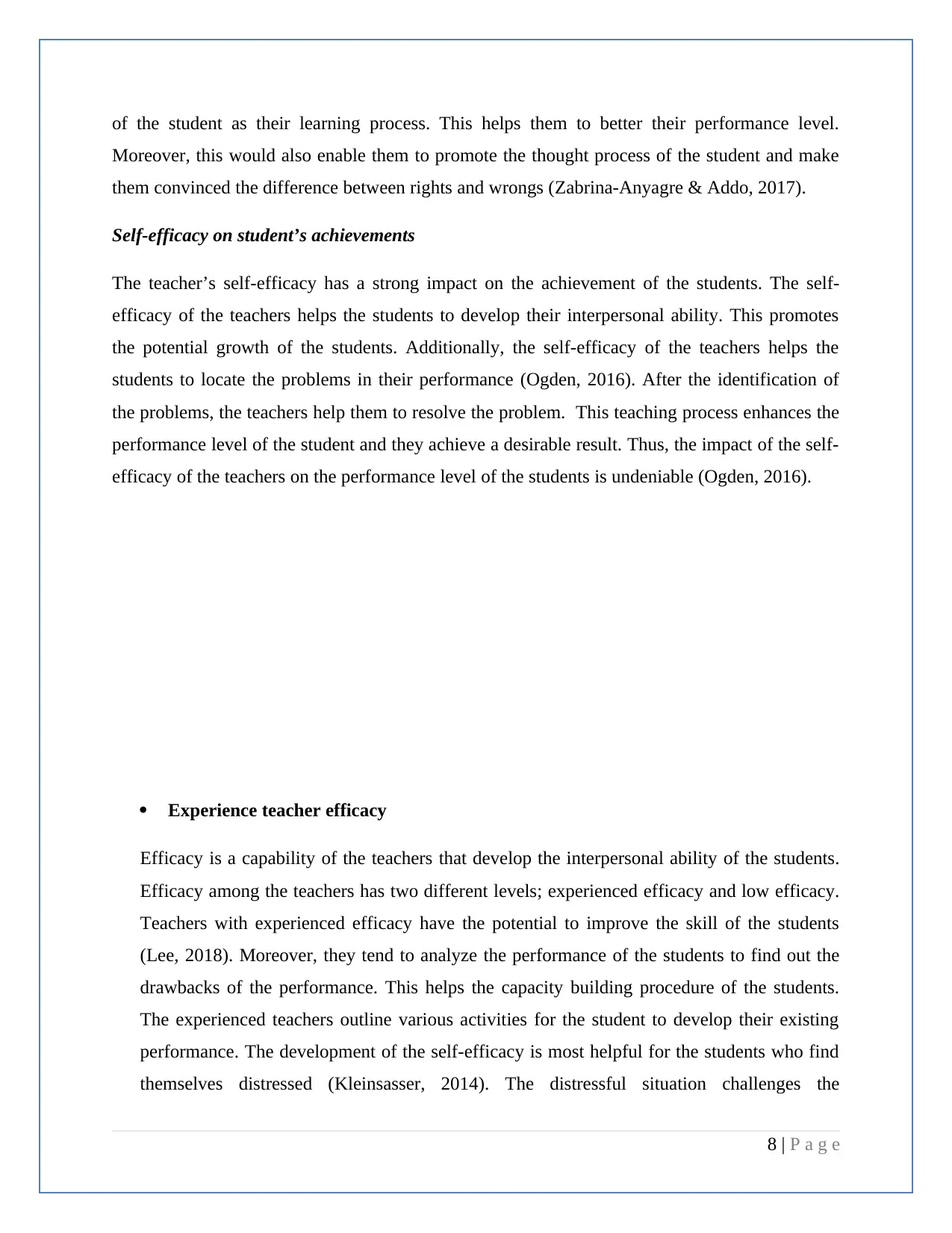
of the student as their learning process. This helps them to better their performance level.
Moreover, this would also enable them to promote the thought process of the student and make
them convinced the difference between rights and wrongs (Zabrina-Anyagre & Addo, 2017).
Self-efficacy on student’s achievements
The teacher’s self-efficacy has a strong impact on the achievement of the students. The self-
efficacy of the teachers helps the students to develop their interpersonal ability. This promotes
the potential growth of the students. Additionally, the self-efficacy of the teachers helps the
students to locate the problems in their performance (Ogden, 2016). After the identification of
the problems, the teachers help them to resolve the problem. This teaching process enhances the
performance level of the student and they achieve a desirable result. Thus, the impact of the self-
efficacy of the teachers on the performance level of the students is undeniable (Ogden, 2016).
Experience teacher efficacy
Efficacy is a capability of the teachers that develop the interpersonal ability of the students.
Efficacy among the teachers has two different levels; experienced efficacy and low efficacy.
Teachers with experienced efficacy have the potential to improve the skill of the students
(Lee, 2018). Moreover, they tend to analyze the performance of the students to find out the
drawbacks of the performance. This helps the capacity building procedure of the students.
The experienced teachers outline various activities for the student to develop their existing
performance. The development of the self-efficacy is most helpful for the students who find
themselves distressed (Kleinsasser, 2014). The distressful situation challenges the
8 | P a g e
Moreover, this would also enable them to promote the thought process of the student and make
them convinced the difference between rights and wrongs (Zabrina-Anyagre & Addo, 2017).
Self-efficacy on student’s achievements
The teacher’s self-efficacy has a strong impact on the achievement of the students. The self-
efficacy of the teachers helps the students to develop their interpersonal ability. This promotes
the potential growth of the students. Additionally, the self-efficacy of the teachers helps the
students to locate the problems in their performance (Ogden, 2016). After the identification of
the problems, the teachers help them to resolve the problem. This teaching process enhances the
performance level of the student and they achieve a desirable result. Thus, the impact of the self-
efficacy of the teachers on the performance level of the students is undeniable (Ogden, 2016).
Experience teacher efficacy
Efficacy is a capability of the teachers that develop the interpersonal ability of the students.
Efficacy among the teachers has two different levels; experienced efficacy and low efficacy.
Teachers with experienced efficacy have the potential to improve the skill of the students
(Lee, 2018). Moreover, they tend to analyze the performance of the students to find out the
drawbacks of the performance. This helps the capacity building procedure of the students.
The experienced teachers outline various activities for the student to develop their existing
performance. The development of the self-efficacy is most helpful for the students who find
themselves distressed (Kleinsasser, 2014). The distressful situation challenges the
8 | P a g e
⊘ This is a preview!⊘
Do you want full access?
Subscribe today to unlock all pages.

Trusted by 1+ million students worldwide
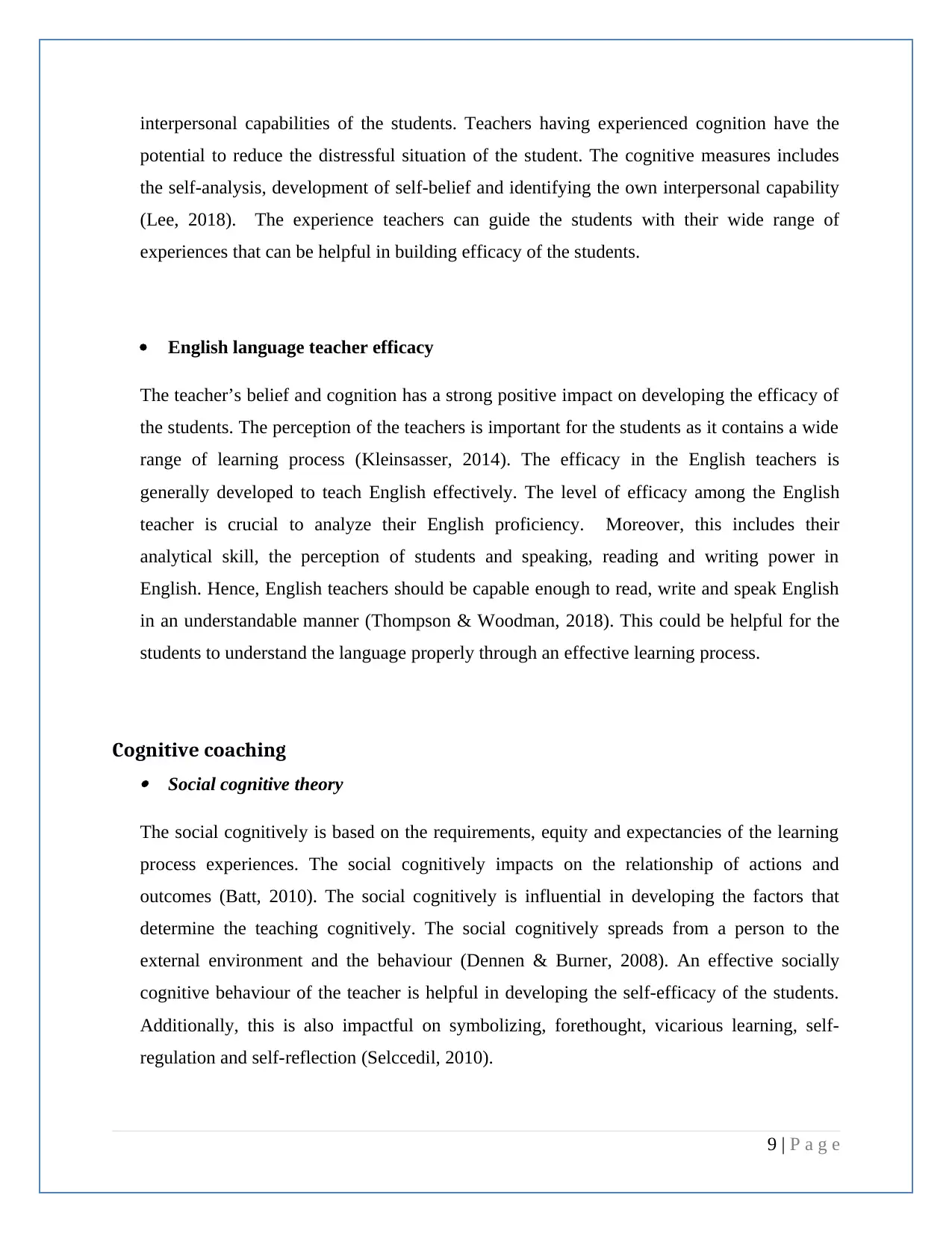
interpersonal capabilities of the students. Teachers having experienced cognition have the
potential to reduce the distressful situation of the student. The cognitive measures includes
the self-analysis, development of self-belief and identifying the own interpersonal capability
(Lee, 2018). The experience teachers can guide the students with their wide range of
experiences that can be helpful in building efficacy of the students.
English language teacher efficacy
The teacher’s belief and cognition has a strong positive impact on developing the efficacy of
the students. The perception of the teachers is important for the students as it contains a wide
range of learning process (Kleinsasser, 2014). The efficacy in the English teachers is
generally developed to teach English effectively. The level of efficacy among the English
teacher is crucial to analyze their English proficiency. Moreover, this includes their
analytical skill, the perception of students and speaking, reading and writing power in
English. Hence, English teachers should be capable enough to read, write and speak English
in an understandable manner (Thompson & Woodman, 2018). This could be helpful for the
students to understand the language properly through an effective learning process.
Cognitive coaching Social cognitive theory
The social cognitively is based on the requirements, equity and expectancies of the learning
process experiences. The social cognitively impacts on the relationship of actions and
outcomes (Batt, 2010). The social cognitively is influential in developing the factors that
determine the teaching cognitively. The social cognitively spreads from a person to the
external environment and the behaviour (Dennen & Burner, 2008). An effective socially
cognitive behaviour of the teacher is helpful in developing the self-efficacy of the students.
Additionally, this is also impactful on symbolizing, forethought, vicarious learning, self-
regulation and self-reflection (Selccedil, 2010).
9 | P a g e
potential to reduce the distressful situation of the student. The cognitive measures includes
the self-analysis, development of self-belief and identifying the own interpersonal capability
(Lee, 2018). The experience teachers can guide the students with their wide range of
experiences that can be helpful in building efficacy of the students.
English language teacher efficacy
The teacher’s belief and cognition has a strong positive impact on developing the efficacy of
the students. The perception of the teachers is important for the students as it contains a wide
range of learning process (Kleinsasser, 2014). The efficacy in the English teachers is
generally developed to teach English effectively. The level of efficacy among the English
teacher is crucial to analyze their English proficiency. Moreover, this includes their
analytical skill, the perception of students and speaking, reading and writing power in
English. Hence, English teachers should be capable enough to read, write and speak English
in an understandable manner (Thompson & Woodman, 2018). This could be helpful for the
students to understand the language properly through an effective learning process.
Cognitive coaching Social cognitive theory
The social cognitively is based on the requirements, equity and expectancies of the learning
process experiences. The social cognitively impacts on the relationship of actions and
outcomes (Batt, 2010). The social cognitively is influential in developing the factors that
determine the teaching cognitively. The social cognitively spreads from a person to the
external environment and the behaviour (Dennen & Burner, 2008). An effective socially
cognitive behaviour of the teacher is helpful in developing the self-efficacy of the students.
Additionally, this is also impactful on symbolizing, forethought, vicarious learning, self-
regulation and self-reflection (Selccedil, 2010).
9 | P a g e
Paraphrase This Document
Need a fresh take? Get an instant paraphrase of this document with our AI Paraphraser
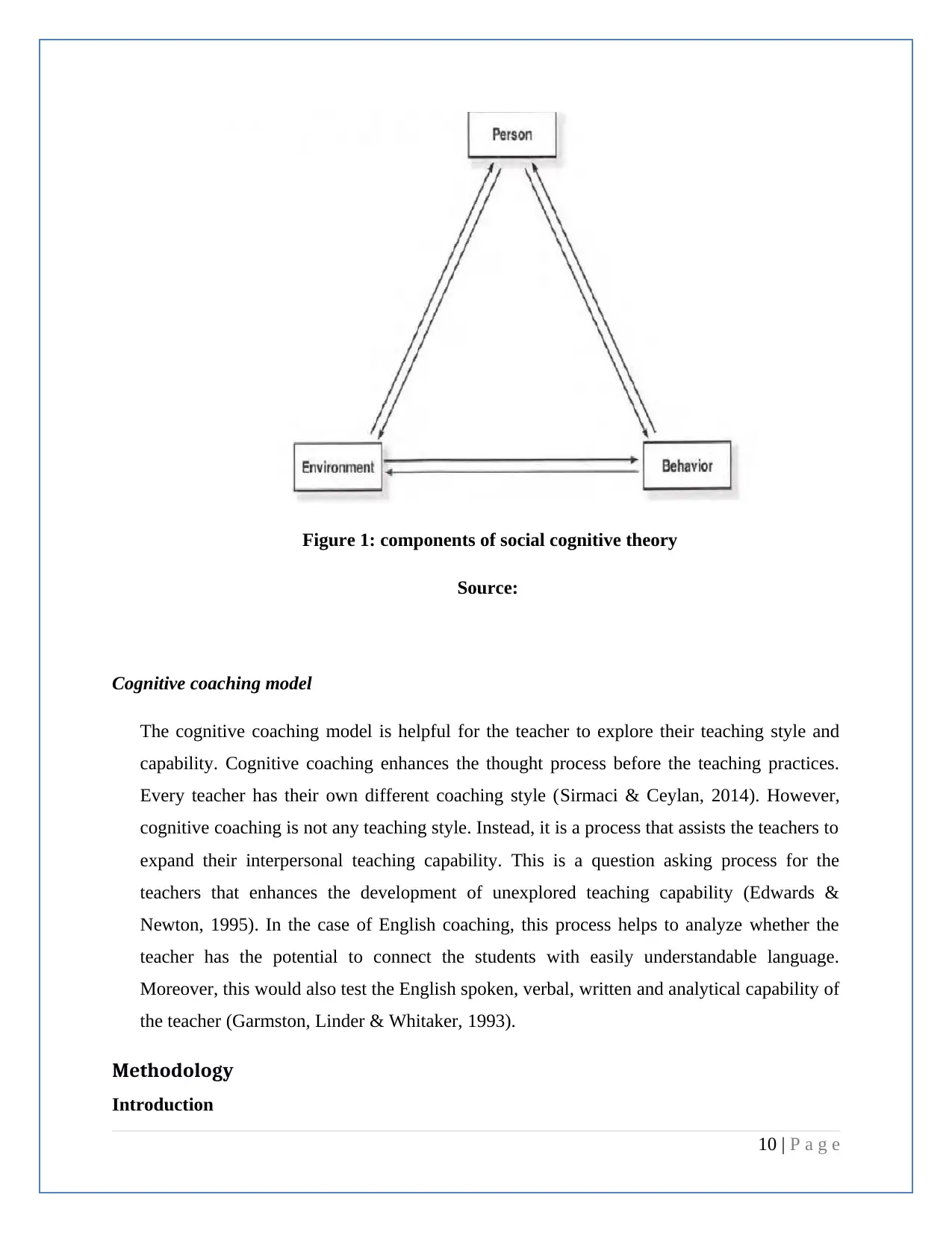
Figure 1: components of social cognitive theory
Source:
Cognitive coaching model
The cognitive coaching model is helpful for the teacher to explore their teaching style and
capability. Cognitive coaching enhances the thought process before the teaching practices.
Every teacher has their own different coaching style (Sirmaci & Ceylan, 2014). However,
cognitive coaching is not any teaching style. Instead, it is a process that assists the teachers to
expand their interpersonal teaching capability. This is a question asking process for the
teachers that enhances the development of unexplored teaching capability (Edwards &
Newton, 1995). In the case of English coaching, this process helps to analyze whether the
teacher has the potential to connect the students with easily understandable language.
Moreover, this would also test the English spoken, verbal, written and analytical capability of
the teacher (Garmston, Linder & Whitaker, 1993).
Methodology
Introduction
10 | P a g e
Source:
Cognitive coaching model
The cognitive coaching model is helpful for the teacher to explore their teaching style and
capability. Cognitive coaching enhances the thought process before the teaching practices.
Every teacher has their own different coaching style (Sirmaci & Ceylan, 2014). However,
cognitive coaching is not any teaching style. Instead, it is a process that assists the teachers to
expand their interpersonal teaching capability. This is a question asking process for the
teachers that enhances the development of unexplored teaching capability (Edwards &
Newton, 1995). In the case of English coaching, this process helps to analyze whether the
teacher has the potential to connect the students with easily understandable language.
Moreover, this would also test the English spoken, verbal, written and analytical capability of
the teacher (Garmston, Linder & Whitaker, 1993).
Methodology
Introduction
10 | P a g e
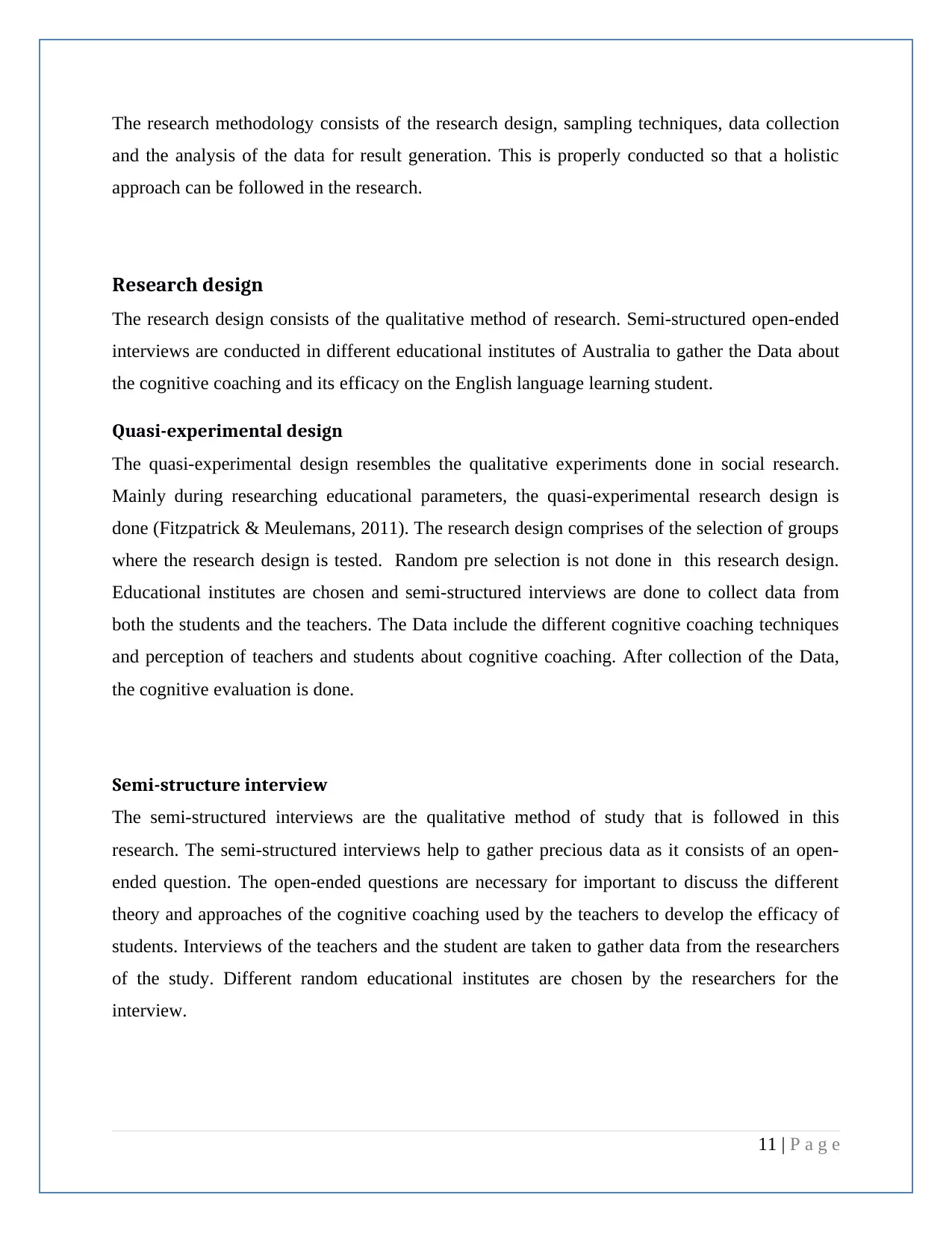
The research methodology consists of the research design, sampling techniques, data collection
and the analysis of the data for result generation. This is properly conducted so that a holistic
approach can be followed in the research.
Research design
The research design consists of the qualitative method of research. Semi-structured open-ended
interviews are conducted in different educational institutes of Australia to gather the Data about
the cognitive coaching and its efficacy on the English language learning student.
Quasi-experimental design
The quasi-experimental design resembles the qualitative experiments done in social research.
Mainly during researching educational parameters, the quasi-experimental research design is
done (Fitzpatrick & Meulemans, 2011). The research design comprises of the selection of groups
where the research design is tested. Random pre selection is not done in this research design.
Educational institutes are chosen and semi-structured interviews are done to collect data from
both the students and the teachers. The Data include the different cognitive coaching techniques
and perception of teachers and students about cognitive coaching. After collection of the Data,
the cognitive evaluation is done.
Semi-structure interview
The semi-structured interviews are the qualitative method of study that is followed in this
research. The semi-structured interviews help to gather precious data as it consists of an open-
ended question. The open-ended questions are necessary for important to discuss the different
theory and approaches of the cognitive coaching used by the teachers to develop the efficacy of
students. Interviews of the teachers and the student are taken to gather data from the researchers
of the study. Different random educational institutes are chosen by the researchers for the
interview.
11 | P a g e
and the analysis of the data for result generation. This is properly conducted so that a holistic
approach can be followed in the research.
Research design
The research design consists of the qualitative method of research. Semi-structured open-ended
interviews are conducted in different educational institutes of Australia to gather the Data about
the cognitive coaching and its efficacy on the English language learning student.
Quasi-experimental design
The quasi-experimental design resembles the qualitative experiments done in social research.
Mainly during researching educational parameters, the quasi-experimental research design is
done (Fitzpatrick & Meulemans, 2011). The research design comprises of the selection of groups
where the research design is tested. Random pre selection is not done in this research design.
Educational institutes are chosen and semi-structured interviews are done to collect data from
both the students and the teachers. The Data include the different cognitive coaching techniques
and perception of teachers and students about cognitive coaching. After collection of the Data,
the cognitive evaluation is done.
Semi-structure interview
The semi-structured interviews are the qualitative method of study that is followed in this
research. The semi-structured interviews help to gather precious data as it consists of an open-
ended question. The open-ended questions are necessary for important to discuss the different
theory and approaches of the cognitive coaching used by the teachers to develop the efficacy of
students. Interviews of the teachers and the student are taken to gather data from the researchers
of the study. Different random educational institutes are chosen by the researchers for the
interview.
11 | P a g e
⊘ This is a preview!⊘
Do you want full access?
Subscribe today to unlock all pages.

Trusted by 1+ million students worldwide
1 out of 17
Related Documents
Your All-in-One AI-Powered Toolkit for Academic Success.
+13062052269
info@desklib.com
Available 24*7 on WhatsApp / Email
![[object Object]](/_next/static/media/star-bottom.7253800d.svg)
Unlock your academic potential
Copyright © 2020–2026 A2Z Services. All Rights Reserved. Developed and managed by ZUCOL.





